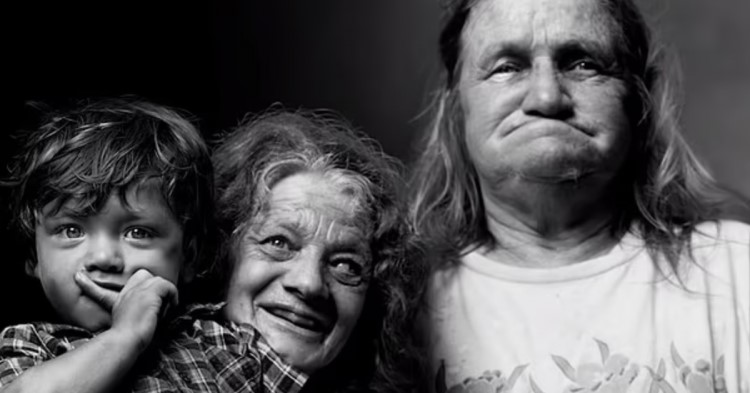In the quaint village of Odd, located 75 miles south of Charleston, West Virginia, resides the Whittaker family, known for their unique and isolated way of life. Mark Laita, a documentary producer, decided to shed light on this remarkable family by releasing a 12-minute film on his YouTube channel, Soft White Underbelly. This short film provides insight into their daily lives and the challenges they face as a result of their genetic background.
The Whittaker family, consisting of Larry, Betty, Kenneth, Ray, Timmy, and Lorraine, have been living in relative obscurity, communicating through grunts and barks and avoiding contact with outsiders. Their unconventional way of life has earned them comparisons to the characters from the 1972 thriller film “Deliverance.” Laita first encountered the Whittakers in 2004 when he attempted to photograph them for his book, “Created Equal,” which aimed to showcase diverse cultures in the United States.
The family’s genetic complications stem from the fact that their parents were double first cousins, meaning they shared both sets of grandparents. This unusual familial connection has resulted in various behavioral issues, as documented by Laita. He revisited the family in 2020 to delve deeper into their lives and subsequently created a documentary to share their story with the world.
In the latest video, Brandon, a 20-year-old mine maintenance worker and a member of the Whittaker family, introduces his new son, Braxton, to the world. This joyful addition to the family is a significant event for them. In the video, Brandon reveals that he is already a father to an unnamed daughter, highlighting the complexities of their familial relationships.
Laita’s documentary also features heartwarming moments, such as great-grandmother Betty bouncing baby Braxton on her knee while they all smile. These glimpses into their lives offer a more intimate understanding of the Whittakers beyond the stereotypes associated with their isolated existence.
The Whittaker family’s living conditions, as shown in the documentary, are far from ideal. They reside in a small and overcrowded home in the impoverished village of Odd, West Virginia. The family shares their living space with several animals, emphasizing the challenges they face on a daily basis.
While the documentary portrays the family’s struggles, it also raises questions about inbreeding and its consequences. According to Discover Magazine, inbreeding can lead to a range of side effects, including decreased cognitive abilities, reduced height and lung function, and an increased risk of diseases. Remarkably, the Whittaker family members themselves did not initially connect their genetic issues to inbreeding.
To assist the Whittaker family in improving their living conditions, Mark Laita initiated a GoFundMe campaign in 2022, which has raised $46,433 to date. However, the documentary has also sparked controversy, with some viewing it as exploitative. Critics argue that it perpetuates stereotypes about inbreeding in Appalachia, which has plagued the region for decades.
West Virginia is one of the poorest states in the United States, and Odd, the village where the Whittaker family resides, has only 800 residents. Nearly 17 percent of West Virginia’s 1.77 million residents live in poverty, surpassing the national average. This disparity in wealth adds complexity to the challenges faced by the Whittaker family and others in their community.
In conclusion, the Whittaker family’s unique story sheds light on the complexities of their isolated existence and the challenges they face as a result of their genetic background. Mark Laita’s documentary offers a glimpse into their lives, sparking conversations about inbreeding and the need for support in impoverished communities like Odd, West Virginia. While the documentary has faced criticism, it also highlights the importance of addressing the underlying issues faced by families like the Whittakers and working towards their betterment.
